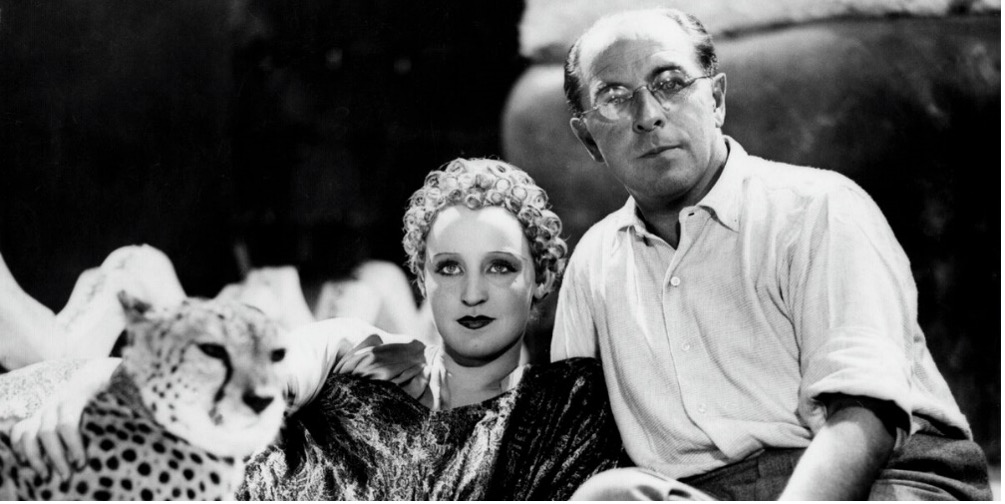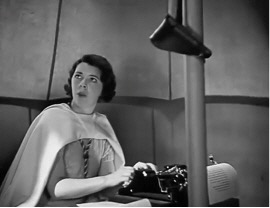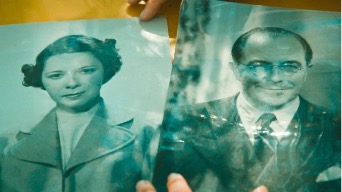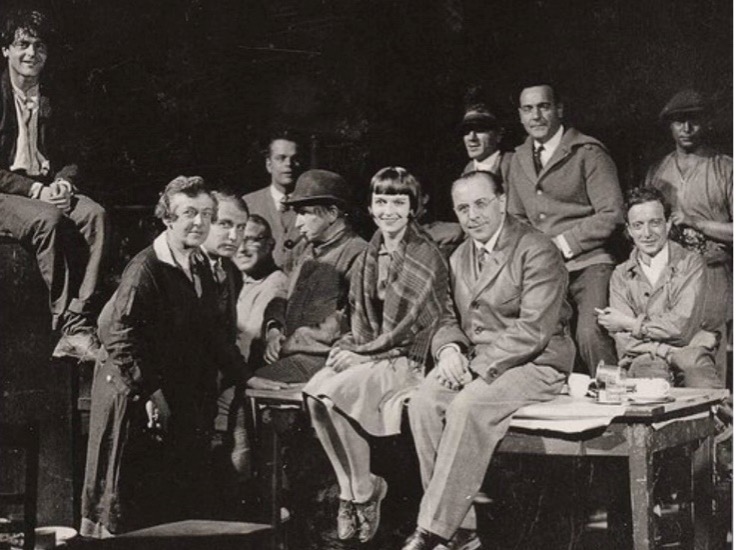Note: For an optimal reading experience, please ensure your browser is rendering the page at 100% zoom ("Cmd/Ctrl +/-").
Pabst - G.W.'s Legacy
BRENDA BENTHIEN
Pandora's Legacy
Georg Wilhelm Pabst's grandchildren are unusual personalities with unusual professions. Prompted by a chance encounter with youngest grandchild Daniel, Austrian film director Angela Christlieb determined to find out more about G.W.'s family – and in particular his little-known wife Trude (born Gertrude Hennings). The result is Pandora's Legacy (Pandoras Vermächtnis, 2024), a mosaic documentary that intersperses Trude's letters and dream writing with excerpts from Pabst's films and Christlieb's encounters with his descendants.
Angela Christlieb is a former theater manager at Anthology Film Archives in New York who studied film production at the New School. Her website notes that her experimental, quasi-documentary films often focus on "people who live in self-created 'imaginary' worlds or indulge in outlandish passions." The Pabst family provides her with plenty of suitable material.
The filmmaker employs a technique she terms "associative montage," whereby she puts different film levels in new contexts that prompt associations. Archival film sequences and contemporary interviews are intertwined in three narrative strands: G.W.'s and Trude's story from 1925 to the 1980s; the grandchildren's observations and reminiscences; and the films of G.W. Pabst. Though this makes for interesting viewing, the audience may find it challenging to "follow the plot." Which might be the point.
Angela Christlieb is fascinated by the family's passions, which they take seriously and pursue intently. Is it mere coincidence that their present-day activities correspond in certain ways to the films of G.W. Pabst? It's hard to tell how seriously Christlieb takes her mystical conclusions. Grandson Ben was named after the cave explorer in Pabst's Mysterious Shadows (Geheimnisvolle Tiefe, script: Trude Pabst). Was he somehow predestined to be a dinosaur researcher? We learn that Ben's half-sister Marion, a biotechnologist and an activist with a passion for butterfly breeding, has inherited her grandmother Trude's missionary zeal and spiritual values. Marion's brother Daniel is an aural/visual artist (like G.W.!), a photographer and musician who composed and recorded the otherworldly soundtrack for this film.
In lengthy diary passages that are read by a speaker, Trude, who married Pabst in 1924 aged 24 and traveled with him to film locations around the world, describes her experiences, memories and dreams. These writings appear to indicate conflicts in her psyche (perhaps not coincidentally, psychoanalysis was en vogue in Berlin in the early 1920's). Individual diary fragments come together over the course of the film to form a picture of Trude's inner struggles which, her grandchildren claim, centered on her desire to keep working as an actress in the face of her husband's overbearing personality. Certainly Trude was also envious of the time her husband spent in the company of glamorous actresses like Greta Garbo, Louise Brooks and Brigitte Helm.

Brigitte Helm and Pabst making The Mistress of Atlantis in 1932. Photo: ullstein bild/picture alliance
One hundred years after Pabst's psychoanalytical Secrets of a Soul (Geheimnisse einer Seele) and his exotic The Mistress of Atlantis (L'Atlantide), Pandora's Legacy too has a fantastic, visionary quality. Mistress of Atlantis designer Ernö Metzner wrote that his sets were meant to "…give the impression of complete reality, while on the other hand this reality must be rendered improbable. The task is an interesting one; it stimulates the imagination."1 (More on Pabst's use of space can be found in Pamela Hutchinson's essay "Weimar Noir.") With a small role in the Atlantis film, Trude was part of the entourage that filmed for months in the Sahara in 1932 – and it was there, beneath the vast African sky, that she experienced a spiritual awakening. Her newfound vision of an alternate reality changed her life, accompanying her until she described it to her granddaughter Marion years later.

Trude Pabst as a journalist in The Mistress of Atlantis, 1932
Various elements play a role in the current generation's conflicted feelings about G.W. Though proud of his body of artistic work, they are less proud of their grandparents' return to Austria prior to the outbreak of World War II. No longer able to leave Europe, G.W. made films under the Nazi regime, leading many critics then and now to label him a sympathizer. What's more, their grandchildren concur that both Trude and G.W. were "not good with emotions," meaning they were remote and less than supportive parents. Grandson Daniel recounts the strained relationship between his father Michael and his grandfather. It seems that, while G.W.'s nearsightedness quashed his youthful dream of becoming an officer, he retained the requisite personality. Daniel recalls him as overbearing and a strict disciplinarian who required obedience from those around him (no doubt excellent qualities in a film director, though less so in a grandfather). Grandson Ben says G.W. was a remote figure who had no experience with children but occasionally "allowed" them to visit. The old man apparently dominated not only family photos but also family relationships.
Now that Pandora's Legacy and Daniel Kehlmann's novel (more on that below) have drawn renewed interest in G.W.'s life, the Pabsts have commissioned a new, comprehensive biography. Watch the WeimarCinema.org space for updates.
1 Excerpt from Hans-Michael Bock's excellent short biography "Georg Wilhelm Pabst: Documenting a Life and Career," in translation in The Films of G.W. Pabst, ed. Eric Rentschler, Rutgers University Press, 1990, p. 228.
G.W. and Trude and Lulu
Trude Pabst's testimonies, diary entries and letters paint a different picture of the "genius" than the one we're familiar with. The letters the couple exchanged during the long periods they spent apart, many of which are read here by speakers, provide every indication that they retained a loving bond. Yet the conflicting standards of the era are evident in both their relationship and in Pabst's films. Pandora's Legacy reveals the tensions that arose between the couple around parenthood, spirituality, his time spent away from her, and Trude's desire to work.
We hear that G.W. suppressed Trude's professional and personal needs: by telling her she wasn't photogenic enough to appear in movies; by insisting she not breastfeed their sons (born ten years apart); and by requiring her to have abortions when she got pregnant at inconvenient times. Still, in his letters he encouraged her to keep making use of her talent for script writing.
In an interview with Karin Schiefer about Pandora's Legacy for Austrian Films in December 2023, director Angela Christlieb describes her film's reference to the legend of Pandora, and thus to Pabst's film Pandora's Box.

From Pandora's Legacy
G.W.'s grandchildren detect the contradiction: his films showed solidarity with the underdog and portrayed modern women in the form of actresses like Louise Brooks and Brigitte Helm. At the same time, he suppressed his own wife's artistic ambitions. The Pabsts' son Michael surmises that his father wanted to shape his mother, to make her his creation – perhaps not unlike the way he created characters. Trude was, after all, a childlike 24 when she married 38-year-old G.W.
Yet G.W. seemed to admire strong, powerful women. In his 1956 article "Out of Pandora's Box:2," James Card wrote, "If there was any pattern at all to Pabst's interests in his choice of stories, it was obvious...that his field was psychology rather than sociology, his concern more with the battle of the sexes than the struggle of the classes. In five out of seven of the films Pabst had directed by 1928, the dominant protagonist was a woman." This appreciation of dominant women might also explain his friendship with Leni Riefenstahl. In Pandora's Legacy, we hear him writing in an admiring letter to Trude in April 1940, "Leni is her own boss, with no middlemen. Directly subordinate to H."
And then there was Lulu.

On the set of Pandora's Box, 1929
The Pabsts rather cheerfully acknowledge Louise Brooks' influence on their grandfather by including her picture on a family photo wall. They assume that G.W. and Brooks had an affair sometime during or after the making of Pandora's Box and Diary of a Lost Girl (1929). Still, they seem to bear her no particular grudge – though they do recall the family's desperation to keep Brooks' tell-all memoir hidden from Trude in later years.
Richard Leacock and Susan Woll's 1985 documentary "Lulu in Berlin" features a lengthy 1971 interview with Louise Brooks in which she entertainingly describes her work with G.W. (whom she always referred to as "Mr. Pabst"). It seems the beleaguered director, sometimes with Trude in tow, spent a great deal of effort trying to instill discipline into 22-year-old Louise. A Kansan in Europe for the first time, she went out partying in Berlin every night with her escort George Marshall and an entourage of new friends.
Nevertheless, he persisted. Louise and friends seem to have dragged the reluctant married couple along to fancy locales.
It's no surprise that G.W. tried to rein her in, and that "Trudie" was not amused. Louise was an irrepressible force of nature. The parallel to her character in Pandora's Box is unmistakeable. On trial for the murder of her husband, scorned by the public for her sensuousness and wanton behavior, Lulu appears penitent in widow's black as the prosecutor holds forth:
Young Lulu and Mr. Pabst apparently did have a brief sexual affair – and a much longer love/hate relationship. In a later letter to film historian Kevin Brownlow, Louise Brooks wrote
Then, in her memoirs:
His contradictory desires regarding women are reflected in his predilection for strong screen personalities while he preferred a compliant wife. Perhaps he wanted to shield his beloved Trude from the pitfalls of celebrity by keeping her out of the limelight. This paradox too is part of G.W. Pabst's conflicted legacy.
Though many reviled him as a Nazi sympathizer, Louise Brooks remained loyal to Mr. Pabst throughout her life.
2 in Image, Journal of Photography and Motion Pictures of the George Eastman House, Vol. 5, No. 7, September 1956, p. 151.
3 Louise Brooks' letter to Kevin Brownlow, April 29, 1969, cited in Barry Paris, Louise Brooks, Alfred A Knopf, Inc., 1989, p. 330.
4 Louise Brooks, Lulu in Hollywood, University of Minnesota Press, 2000, pp. 97-98.
Pabst "The Director"
Best-selling German author Daniel Kehlmann's novel The Director was recently published in an English translation by Ross Benjamin. Originally titled Lichtspiel, it is a fictionalized version of G.W.'s peripatetic and conflicted life that has stoked renewed interest in the filmmaker. A number of German critics have taken issue with the author's fictionalization of historic events, with which German readers are keenly familiar. Among other things, Kehlmann's suggestion that Pabst was a (reluctant) Nazi collaborator who used concentration camp inmates as extras in a film has raised the ire of the Pabst family (article in German). Pabst granddaughter Marion and the German publisher, Rowohlt-Verlag, have agreed that a note that the work is fictional will be added to the book in future editions. Indeed, film archivist and historian Chris Horak writes that the novel "raises the question regarding the degree to which the life of a historical personage, especially one whose relatives are still with us, can be fictionalized."
Meanwhile, the U.S. press has tended to laud the novel's inventiveness while drawing parallels to current pressing topics about repression and artistic freedom. To promote the book's English publication, Kehlmann appeared on the MSNBC program "Morning Joe," where he described his intention "to write about what life was like in a dictatorship." The conversation turned to the choices people make when reaching forks in life's roads: "In a dictatorship, compromises sneak up on you... For some reason, I felt it was a relevant topic to write about right now." Discussions of the book's timeliness appeared in prestigious papers as well: The New York Times published an article entitled "In a Nazi-Era Filmmaker's Compromises, a Novelist Finds Reasons to Fear" and wondered "How to Make Art Under the Nazis (Without Losing Your Soul)," while The Boston Globe asked "Is it possible to make great art under fascism?"
Interest in the life and legacy of Georg Wilhelm Pabst is stronger than it has been for years. Now is an excellent time to revisit his films.
Pandora's Legacy (2024, 1:29, English subtitles) has screened in the following festivals to date:
IFFR Rotterdam (premiere, January 2024)
Diagonale Graz (nominated for the documentary film prize)
BAFICI International Film Festival Buenos Aires
Mostra International Film Festival Sao Paulo
International Film Festival Hof
Kassler Doc Fest
Free Zone Belgrade Festival
Stranger Than Fiction Festival Köln/NRW
Achtung Berlin! Film Festival
Though the film has not yet found a US distributor, it will screen in November at the Anthology Film Archives in New York, together with films by Pabst. Additional screenings are being planned.
The author of this article wishes to thank Thomas Gladysz, Director of the Louise Brooks Society and Lulu expert extraordinaire, who provided valuable tips on her work with Pabst.